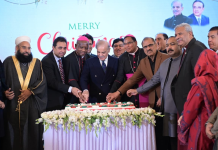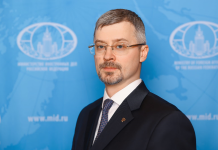By Ali Furqan
During the fall of USSR at the turn of the last century the Armenian nationalists raised territorial claims to Azerbaijan demanding Nagorno-Karabakh. In 1988 more than 300 thousands Azerbaijanis were expelled from their homelands in Armenia. Some of them were killed with brutality, some died on the mountain passes trying to escape from men-hunters.
The then leader of the Soviet Union Mikhail Gorbachov backed Armenian separatists instead of calming down tension. In respond, thousands of protesters moved to the central squares of Azerbaijan’s capital Baku and other cities demanding to put an end to the communist rule and to restore independence and sovereignty of Azerbaijan.
At wee hours of 20 January, 1990, twenty six thousands of Soviet troops, including the special forces entered Baku from different directions and stormed demonstrators firing the crowds. The forces of Baku garrison and the internal troops joint them, having come out of their barracks, and started shooting and smashing by tank tracks unarmed people. As a result of this unprecedented illegal action, 134 men were killed, about 700 men wounded, 841 men got arrested and 5 were declared missing. There were many children, elderly, women, representatives of different ethnic groups and religions amongst the killed civilians. The soldiers gutted 200 houses, state and private movable and immovable property. Military operation was a rough violence of constitutions of the USSR and Azerbaijan Soviet Socialist Republic as well as International Pact on civil and Political writes.
Before the operation the energy block of Azerbaijan Television was blasted and people were deprived of information. The state of emergency was announced only seven hours after operation began. These all are clear indications of the fact that the main aim of this massacre was to teach a lesson to the nation that dared to demand independence.
Human Rights Watch report stated during those days: “Indeed, the violence used by the Soviet Army on the night of 19-20 January was …as to constitute an exercise in collective punishment. Since Soviet officials have stated publicly that the purpose of the intervention of Soviet troops was to prevent the ouster of the Communist-dominated government of the Republic of Azerbaijan by the nationalist-minded, noncommunist opposition, the punishment inflicted on Baku by Soviet soldiers may have been intended as a warning to nationalists, not only in Azerbaijan, but in
the other Republics of the Soviet Union.”
But the plans of Central Soviet Government failed. On 21 January, 1990, the National Leader of Azerbaijan, Mr. Heydar Aliyev, who was living in Russia under the eye of Soviet KGB, ignoring the threat to his life, came to the Permanent Mission of Azerbaijan SSR in Moscow and in his speech before thousands of ethnical Azerbaijanis strongly condemned communist leaders of the USSR for the massacre. That was a first open statement against regime which not only broke information blockade around that very event but also instilled the confidence to the hearts of Azerbaijanis.
On 22nd January, despite of warnings of the military rulers of Baku, more than one million people turned out to bury the victims of that bloody night. The entire country announced a strike for 40 days what badly affected the USSR economy which was dependent on Azerbaijan’s oil machinery. A special session of the Parliament of Azerbaijan SSR held on the same day condemned the military operation of Soviet Army.
The Black January was a turning point in the history of Azerbaijan. The brutal use of force in Azerbaijan created an anti-force. It buried chances of preserving the collapsing empire and resurrected national movement for independence. Despite of military, political and moral aggression, Azerbaijani national movement kept on struggling and succeeded to stand against the Soviet challenge. This was a beginning of the end of the USSR. Later, M.Gorbachov said: “The declaration of the state of emergency in Baku was the biggest mistake of my political career.”
Azerbaijan declared its independence on October 18, 1991. According to the 16 December, 1999 decree of the President of Azerbaijan Mr. Heydar Aliyev all victims of the massacre were awarded the title “Martyrs of January 20”. The families of the 20 January’s victims taken care by Government. Facilities for free accommodation, education, healthcare and other privileges provided to them.
People of Azerbaijan will never forget the sons and daughters of Azerbaijan who laid down lives for the freedom of their motherland. Every year on 20th of January hundreds of thousands of Azerbaijanis visit the Alley of Martyrs which is located on the highest peak of Baku to pay tribute to those who embraced martyrdom.
The writer is a senior journalist based in Islamabad.












